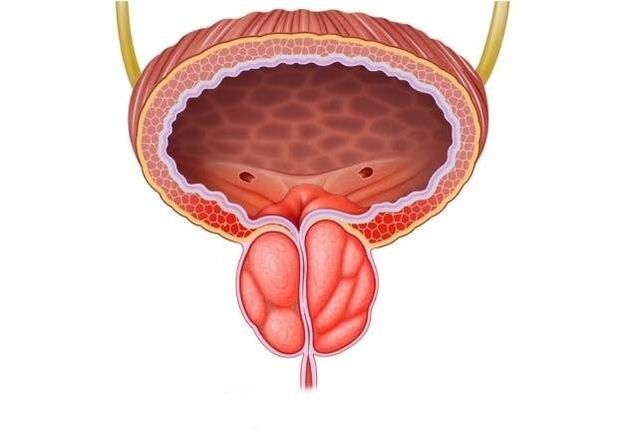
Today, inflammation of the prostate gland is the leader in the group of male diseases that are predominantly sexually transmitted. Its complications threaten infertility, reduced libido and impotence.
Symptoms of prostatitis are not only pain, urination disorders and inflammation of the spermatic cord. The most dangerous consequence of advanced inflammation can be cancerous degeneration of the prostate. While the pathological process diagnosed in time is easily stopped.
Causes of inflammation
The risk of developing prostate inflammation increases due to various factors that predispose to the onset of the disease:
- Hypothermia, one-time or associated with the nature of outdoor work.
- A sedentary lifestyle leads to disturbances in the functioning of the digestive system.
- Chronic somatic diseases (diabetes mellitus, hypertension).
- Foci of focal, perifocal infection (rhinitis, tonsillitis, stomatitis, gastritis).
- Persistent UGI (chlamydia, trichomoniasis, herpes virus).
- Stress, insomnia, chronic fatigue syndrome.
- Reduced immunity due to illness, operations, emotional stress.
- Bad habits that lead to the development of intoxication: alcohol, smoking, strong coffee.
- Professional injuries of the perineum of car drivers, athletes, workers in hazardous industries.
- Promiscuous sex life, interrupted sexual intercourse, intercourse devoid of sensuality with incomplete ejaculation, prolonged absence of intimacy (low need for sperm leads to stagnation in the gland).
- Venereal diseases.
Despite a rather large number of provocative moments, the essence of prostatitis is the occurrence of stagnation within the organ on the background of disturbed blood circulation and lymph outflow.
Symptoms of prostatitis
Prostatitis can be suspected based on the following disorders in the functioning of the genitourinary system:
- discomfort when urinating, uncontrolled urination;
- impotence disorder, weak erection, reduced libido;
- difficult urination, feeling of incomplete emptying of the bladder;
- pain in the perineum when sitting for a long time, for example while driving;
- infertility.
The acute stage of the disease causes significant discomfort. This stage is accompanied by the following symptoms:
- frequent painful urge to urinate;
- delay or inability to urinate;
- pulsating pain in the perineum, which is transmitted to the anus and increases during the act of defecation. As a result, defecation difficulties;
- general intoxication of the body, feverish condition.
The chronic form of prostatitis is accompanied by other symptoms:
- slight increase in body temperature;
- constant fatigue;
- slight pain in the perineum, burning in the urethra;
- discomfort during urination and defecation;
- weakening of sexual function and resulting psychoemotional depression.
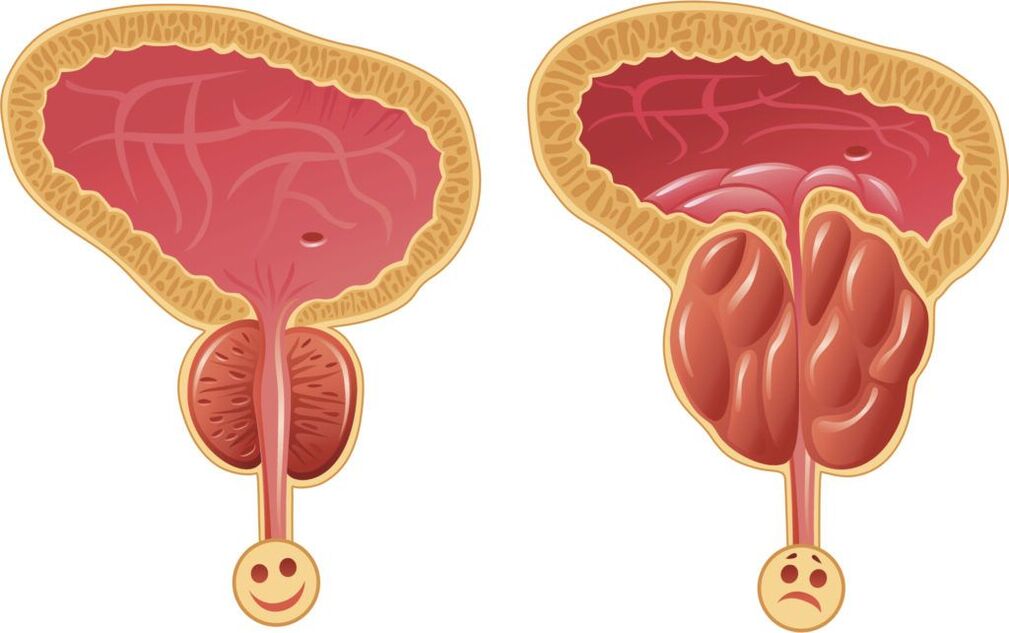
Classification
In modern urology, there is no single classification of diseases. However, doctors prefer this option to classify the inflammatory process in the prostate
According to the course of the disease:
- Acute prostatitis. This accounts for more than 50% of cases of the disease in people not older than 30-35 years.
- Chronic option. It is considered a non-age category. It does not manifest itself for a long time, the stimulus for its development is a cold or an infection.
For the reason that caused the pathology:
- Bacterial inflammation of the prostate, prevalent in men under 40 years of age, appears against the background of ultrasound and does not cross the boundaries of the organ.
- Non-bacterial pathological changes in the gland, mostly chronic.
- Viral inflammation of the prostate is characterized by an acute course that affects the entire genital area.
According to the nature of structural changes in the prostate:
- Fibrous prostatitis is characterized by rapid irreversible growth of the gland and requires radical intervention. Clinically, it resembles prostate adenoma.
- Calculous inflammation of the prostate is caused by the formation of stones inside the prostate. It is considered a sign of cancer.
- Congestive prostatitis, the result of a sedentary lifestyle, is diagnosed in every second patient.
Signs of illness
If a man discovers at least two of the following symptoms of prostatitis, he should immediately contact a qualified specialist:
- Urinary disorder with intermittent, weak stream of urine, unusually short, causing splashing, difficulty and pain before urination. The frequent urge to empty the bladder occurs mostly at night.
- The pain, which is localized in the lower abdomen, radiates to the scrotum, perineum and rectum.
- Sexual dysfunction.
- Problems with ejaculation, changes in sperm (consistency, quantity).
Acute prostatitis
The disease begins with a sudden rise in temperature (up to 40 degrees), painful headache and fever. The symptoms that appear are accompanied by pain in the groin, perineum, back, discharge from the urethra, frequent urination and a constant urge to urinate.
Bladder emptying occurs with a delay and a burning sensation. The urine itself becomes cloudy and may contain blood. Irritability and fatigue appear.
The outcome of acute prostatitis can be a complete resolution of the process (if treatment is started on time). Since changes occur in many pelvic organs, they cannot be left to chance, otherwise corresponding complications will arise:
- Vesiculitis is an inflammation of the seminal vesicles, the cause of the appearance of pus in the sperm, which not only reduces the quality of the ejaculate, but also leads to the loss of reproductive function.
- Coliculitis - inflammatory changes in the seminal tubercle become the reason for the development of severe pain during sex, interruption of orgasm and impotence of a psychological nature.
- Abscess formation in the body of the prostate, its rupture and purulent damage to the rectum lead to worsening of symptoms, severe intoxication of the body, and even death.
- Stagnation in prostate tissues leads to changes in their structure, disruption of innervation, blood supply, both to the gland itself, and to organs located nearby, along with disruption of their functions. Erection becomes insufficient for full sexual intercourse, premature ejaculation and prolonged sexual intercourse without orgasm are observed.
- Cicatricial changes in the gland and spermatic cord lead to infertility, reduced sperm quality and sperm motility. Narrowing of the urethra interferes with the normal process of urination; Bladder obstruction can cause acute urinary retention, requiring immediate surgical intervention.
Chronic prostatitis
The main feature of the disease is the vagueness of clinical symptoms with a long, persistent course of the process. More often, the chronic form occurs independently, as a primary pathology against the background of blood stagnation in the vessels (prostatosis), abacterial prostatitis.
The main symptoms of chronic prostatitis are:
- fever;
- pain occurs in the scrotum, perineum, anus, back;
- urination disorder;
- mucous or mucopurulent discharge from the rectum, urethra, even in the absence of urination or defecation;
- erectile dysfunction, painful ejaculation, interrupted sexual intercourse, prolonged intercourse without a feeling of pleasure.
Inaction and improper treatment of chronic prostatitis can cause complications:
- Infertility is the result of chronic inflammation in the spermatic cord, vesicles, testicles and their appendages.
- Cystitis, pyelonephritis (other diseases of the genitourinary system) are the result of hematogenous and mechanical spread of microbes.
- Sepsis.
- Constant decrease in immunity.
- Untreated prostatitis can cause cancer in 35-40% of cases.
Diagnostics
The clinical picture of the disease is typical, so the diagnosis is not difficult. It is performed by a urologist based on the anamnesis, examination of the patient, laboratory minimum using the most modern medical devices:
- Rectal examination of the gland, taking secretions for examination (culture with determination of sensitivity to antibiotics).
- UAC, UAM, bacterial culture of urine.
- Smear test for sexually transmitted diseases, UGI review.
- Daily monitoring of urination rhythm, measurement of urination speed (uroflowmetry).
- Ultrasound or TRUS is used for differential diagnosis.
- If it is necessary to exclude oncology, a biopsy, urography is taken and PSA - prostate specific antigen is determined.
- To diagnose infertility, a spermogram is prescribed - analysis of ejaculate to determine male fertility.
Based on the results of the patient's examination, an individual scheme for the complex treatment of prostatitis is drawn up. When prescribing drugs, the form of the pathology and the presence of accompanying diseases are taken into account. The decision on where to carry out the therapy (inpatient or outpatient) is made by the doctor. The course of treatment is carried out with careful laboratory monitoring of the results.
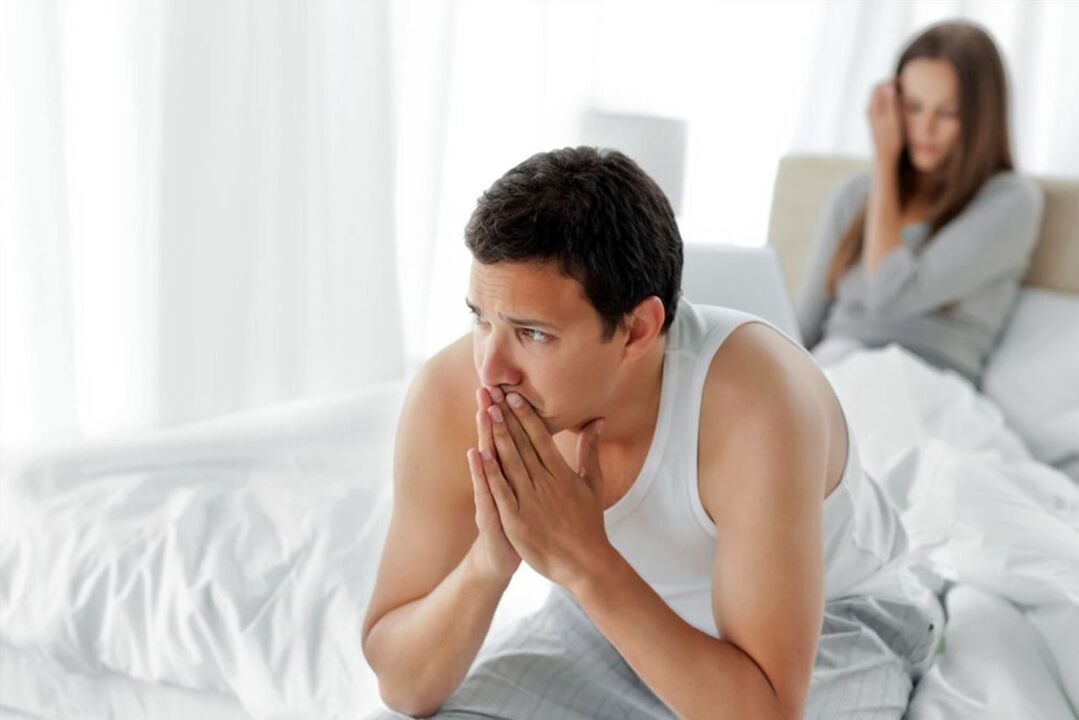
Treatment of acute prostatitis
Acute prostatitis requires bed rest, a special salt-free diet and sexual rest.
Treatment course methods:
- The most effective treatment for prostatitis is etiotropic therapy. If the underlying cause of prostatitis is an infection, the priority is a course of antimicrobial agents that alleviate the manifestations of inflammation.
- The pain syndrome is alleviated with analgesics, antispasmodics, rectal suppositories, microenemas and warm solutions of painkillers. NSAIDs may be used.
- Immunostimulants, immunomodulators, enzymes, vitamin complexes and a combination of microelements have proven their effectiveness.
- Physiotherapy methods are possible only in the subacute phase of the disease. They improve microcirculation and increase immunity: UHF, microwave, electrophoresis, laser, magnetic therapy.
- Massage is another effective method of influencing the prostate. It opens channels, normalizes blood circulation in the scrotum and pelvis.
- Acute renal filtrate retention can be corrected by catheterization and trocar cystostomy.
- The purulent process involves surgical intervention.
- Psychologist consultations.
Treatment of acute prostatitis is complex.
Effective treatment of acute prostatitis in men includes drugs from different pharmacological groups:
- Antibiotics.Broad-spectrum drugs are used that have a bactericidal effect on most pathogens. Antimicrobial treatment is most often an etiotropic measure, because in most cases the cause of prostatitis is microbial pathogens. Antibiotics are prescribed for a bacterial infection, antiviral drugs are prescribed for a viral infection, and if protozoa are detected, drugs against trichomoniasis are prescribed. The choice of antimicrobial agents is made empirically or based on the results of PCR, bacterioscopy and bacterial culture. Selection of antimicrobial agents, determination of their dose, frequency and duration of application can only be done by a doctor. In addition to antibiotics, uroseptics can also be prescribed, which have a disinfecting effect on the mucous membrane of the genitourinary tract.
- Anti-inflammatory drugs.It allows you to reduce the swelling in the tissues and the intensity of the pain. As a rule, non-steroidal anti-inflammatory drugs (NSAIDs) are used for this.
- Vascular drugs- reduce tissue swelling, eliminate congestion in the prostate and thus help reduce pain, improve blood circulation and local metabolic processes in the tissues.
- Enzymes- dilute prostate secretions and encourage drainage of pus. In addition, enzyme drugs increase the effectiveness of antimicrobial treatment by improving the absorption of their active substances in the affected tissues.
- Diuretics (diuretics).They increase the excretion of urine, which contributes to the mechanical "washing out" of the infection.
- When taking antibiotics, patients are prescribed hepaprotectors that protect the liver parenchyma from toxic damage and improve its functional state.
- In order to eliminate and prevent the development of intestinal dysbiosis during antibiotic therapy, patients are prescribed probiotics.
- After the resolution of acute inflammatory phenomena in the prostate, patients are prescribed physiotherapy treatment - medical electrophoresis, galvanization, magnetic, laser, mud therapy, etc. Such procedures improve local microcirculation and lymphatic drainage, metabolic processes and tissue nutrition, stimulate tissue regeneration, accelerate the final resolution of the inflammatory process, promote tissue regeneration and normalization of the functional state of the prostate.
General activities must be carried out.
A diet for acute prostatitis in men is indicated, including a sufficient supply of easily digestible proteins and vitamins.
In the period of exacerbation of inflammation, spicy, fried, fatty, salty foods and marinades are excluded from the diet.
Alcohol consumption is excluded, smoking cessation, abstinence from sexual relations and intensive physical activity, including sports, are recommended.
It is necessary to normalize sleep, work and rest, and to balance the emotional background.
During the period of illness, a person needs functional rest.
With timely, correct diagnosis and treatment of acute prostatitis in a medical institution, the prognosis is favorable - complete recovery occurs.
If acute prostatitis develops, consult a doctor immediately and do not self-medicate!
Treatment of chronic prostatitis
With long-term, course (at least one month) effect on the prostate, there is no 100% guarantee of cure. The priority is herbal medicines, immunocorrection, change of household habits:
- Herbal preparations are widely used in urological practice. They are able to accumulate at the site of the most active pathological process, protect cells from oxidation, remove free radicals and prevent the proliferation of gland tissue.
- Antibacterial therapy is selected individually, based on the sensitivity of microbes to drugs.
- Medicines that strengthen immunity not only help in the fight against prostatitis, but also correct the negative effects of antibiotics that disrupt the function of the immune system.
- The pain syndrome is alleviated by using alpha-blockers and muscle relaxants.
- Prostate massage allows you to mechanically remove the "extra" secretion of the gland through the urethra, improve blood circulation and reduce congestion.
- Physiotherapy: laser, magnet, ultrasound, iontophoresis, warm sitting baths or microenemas with herbs.
- In severe cases, intravenous fluids with diuretics are indicated. It stimulates abundant urine production, prevents symptoms of intoxication, the development of ascending cystitis and pyelonephritis.
- Herbal laxatives are used for constipation.
- Together with the patient, the urologist and psychologist create an individual long-term program of daily routine, necessary rest, nutrition, dosed physical activity and sexual activity.
- If the chronic process is resistant to therapy and the outflow of urine is blocked, surgical intervention is prescribed: removal of the entire affected tissue (transurethral resection of the prostate) or complete removal of the gland with surrounding tissues (prostatectomy). Practiced in exceptional cases, it is full of impotence and urinary incontinence. Young people do not undergo surgery because it can cause infertility.
Drug treatment
Treatment of prostatitis with antibacterial therapy must begin with a bacterial culture, the purpose of which is to assess the organism's sensitivity to this type of antibiotic. If urination is disturbed, the use of anti-inflammatory drugs gives a good result.
Medicines are taken in tablets, in acute cases - by dropper or intramuscularly. Rectal suppositories are effective in the treatment of chronic forms of prostatitis: with their help, drugs reach their goals faster and have a minimal effect on other organs.
Blood thinners and anti-inflammatory drugs have also been shown to be effective.
Antibacterial therapy
Antibiotics are an effective drug in the fight against bacterial prostatitis. In order to achieve the desired effect and not harm the body, the choice of drug, dosage and treatment regimen should be made by a doctor. In order to correctly choose the most effective drugs, he will have to find out what kind of pathogen caused prostatitis, and also test the patient for tolerance to antibiotics of a certain group.
Antibiotics from the fluoroquinolone group have proven to be effective in the treatment of chronic prostatitis. Their action is aimed at suppressing bacterial infection and strengthening the body's own immunity. In addition, the bacteriostatic antibiotic trimethoprim is recommended for the prevention and treatment of accompanying diseases of the genitourinary system.
Treatment of prostatitis caused by mycoplasma and chlamydia can be additionally carried out with drugs from the group of macrolides and tetracyclines, which slow down the spread of the infection.
The duration of taking antibacterial drugs is from 2 to 4 weeks. In case of positive dynamics, the course can be extended.
Physiotherapy
Physiotherapy techniques in the treatment of prostatitis are aimed at activating blood circulation in the pelvic area, improving metabolic processes in the prostate and cleaning the ducts. If physiotherapy is combined with taking antibiotics, the effect of the latter is enhanced.
The main methods include:
- magnetic therapy;
- laser therapy;
- electrophoresis;
- warming up;
- ultrasound;
- mud therapy;
- high frequency radiation;
- physiotherapy.
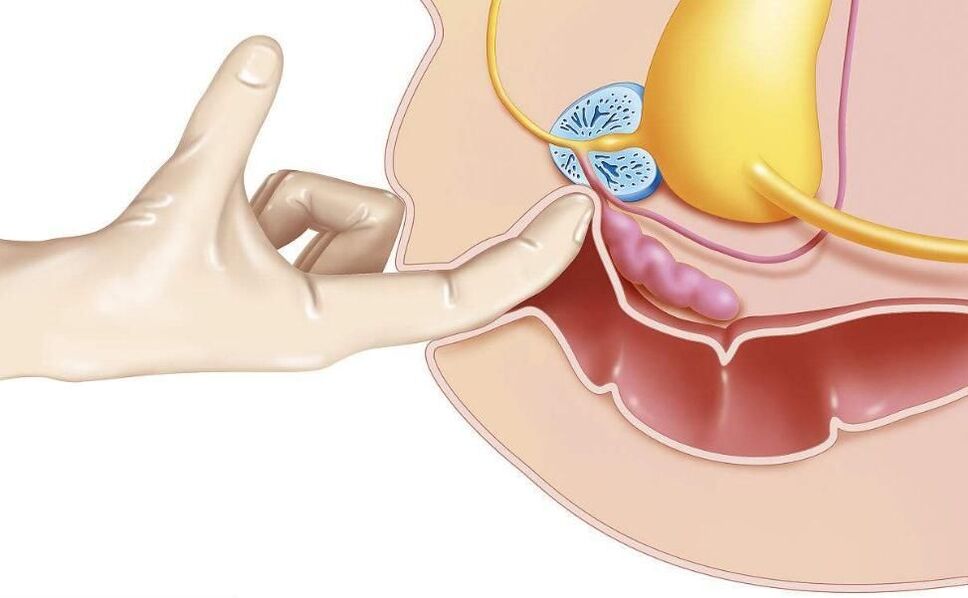
One of the oldest methods, transrectal massage of the prostate, according to modern research, has no proven effectiveness.
Non-specific treatments
Non-specific methods of treatment of prostatitis include:
- hirudotherapy;
- therapeutic fasting;
- acupuncture;
- diet according to the Ostrovsky method;
- alkalization of the organism by the Neumyvakin method.
We strongly recommend that you discuss all non-traditional methods of treating prostatitis with your doctor.
Operation
Surgical methods are used in complex and emergency cases:
- for drainage of purulent abscesses, which are removed by laparoscopic methods through puncture;
- in case of difficulty urinating due to damage to the urinary tract;
- with a large volume of the affected area;
- with a significant number of stones in the body of the gland.
Stones and sclerotic tissue are removed by endoscopic methods. In the case of a larger affected area or multiple stones, resection of the prostate is resorted to.
Transurethral resection is also effective in bacterial prostatitis. In this way, the risk of relapse can be reduced.
Folk remedies
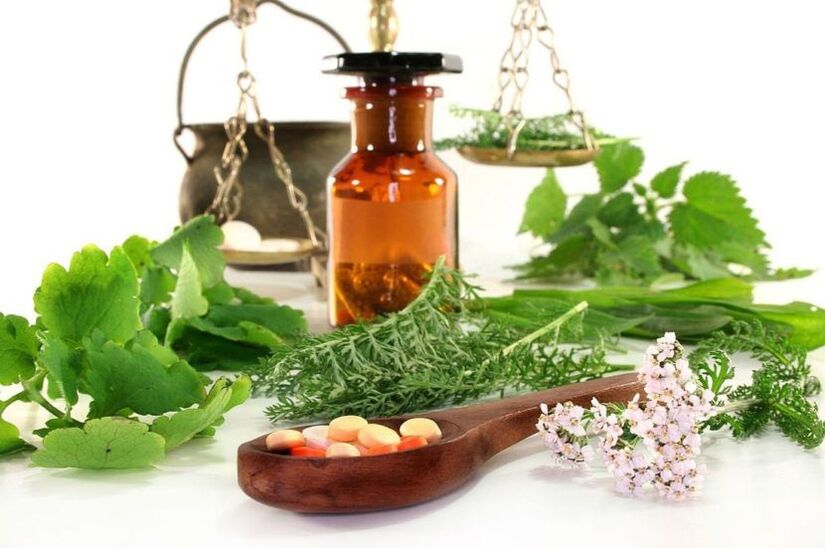
Treatment of prostatitis with folk remedies is unlikely to be effective by itself, but in combination with drugs and physiotherapeutic methods it may be applicable. These include: beekeeping products, decoctions of herbs and seeds, tinctures of garlic, ginger, beaver creek, fresh vegetables, pumpkin seeds.
In acute cases of the disease, it is necessary to consult a doctor, and in no case should you self-medicate! If the purulent abscess bursts, death is possible.
Suppositories for prostatitis
Treatment of prostatitis with rectal suppositories is much more effective than pills, if only because the rectum is much closer to the prostate, which means that the medicine will work faster.
The composition of drugs for the treatment of prostatitis can be completely different, they are prescribed to solve a specific problem.
- Antibacterial agents are particularly effective in prostatitis caused by chlamydia.
- For symptomatic treatment, painkillers are used, which relieve pain well.
- Immunostimulants help improve blood circulation, relieve swelling and are used in complex therapy.
- Herbal medicines have a mild effect. They, like candles on bee products, are used as an addition to the main treatment.
- Compositions based on ichthyol promote blood flow in the area of the intestinal mucosa, which accelerates the weakening of inflammatory processes and slightly improves immunity.
- Products based on special enzymes prevent the formation of scar tissue. It is recommended to be taken as part of complex therapy with antibiotics, anti-inflammatory drugs and painkillers.
Auxiliary drugs
For the symptomatic treatment of prostatitis in men, for example, relieving pain when urinating, you can additionally take antispasmodics, which relax smooth muscles and thereby quickly relieve pain.
General health is improved by blood thinning and anti-inflammatory dietary supplements based on bee products, pumpkin seed oil and palm fruit extract.
Diet and lifestyle
A proper, balanced diet and a healthy lifestyle are very important for the treatment of prostatitis. The food should not contain spicy, fried, salty or sour food. In acute cases, alcohol is strictly prohibited.
Food should contain enough fiber to prevent constipation. The protein content should be reduced. It is recommended to supplement the diet with herbs, ginger and pumpkin seeds.
Consequences of untreated prostatitis
Even if the symptoms of prostatitis do not appear for a long time, it is necessary to undergo a regular examination by a urologist. Incompletely cured prostatitis can be accompanied by the formation of calcifications, which will then have to be removed together with the gland. Experts are convinced that there are no other ways to remove or dissolve stones.
In addition, pathogenic microorganisms can migrate to neighboring organs, causing inflammation. Advanced prostatitis can cause the development of prostate adenoma and cancer.
Prevention
To prevent the appearance of a disease that is unpleasant for men, you need to remove provoking factors and follow simple rules:
- Lead a healthy lifestyle, discard bad habits.
- Don't get too cold.
- Drink at least 1. 5-2 liters of water a day.
- Strengthen your immune system, walk a lot, get stronger.
- Do physical education and sports, visit fitness clubs.
- Avoid stressful situations.
- Practice a regular sex life with a regular partner.























